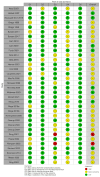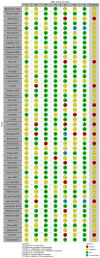Participation and Adherence to Prehabilitation Programs for Colorectal Cancer
- PMID: 40507060
- PMCID: PMC12157972
- DOI: 10.3390/nu17111792
Participation and Adherence to Prehabilitation Programs for Colorectal Cancer
Abstract
Background/Objectives: The preoperative improvement of patients' functional capacity (prehabilitation) has gained attention in the surgical field, especially for colorectal cancer (CRC) patients. Despite the recognized benefits of prehabilitation programs, patients' motivation to participate in and adhere to them remains a significant challenge. Several studies reported difficulties in recruiting participants and low adherence rates. This systematic review explored patients' motivation for participation and adherence to prehabilitation programs for colorectal cancer surgery. Methods: A systematic search was conducted in the PubMed (MEDLINE), Embase, Cochrane, CINAHL, and Web of Science databases. Eligible studies included clinical trials published from inception until December 2024, written in English or Dutch, describing barriers and/or motivators affecting patient participation and adherence in prehabilitation programs. Results: A total of 89 studies, including 34 randomized controlled trials, were included. In total, 13,383 patients were included, with 7162 in the prehabilitation cohort. Participation rates ranged from 0 to 99.4%, and adherence rates ranged from 15% to 100%. Factors limiting participation included logistical issues and a busy schedule. Professional guidance, peer support, and regaining a sense of control improved adherence. Medical reasons, conflicting obligations, and intensive exercise limited adherence. Conclusions: This systematic review analyzed the current literature on participation and adherence in prehabilitation programs for colorectal cancer surgery patients. Overcoming logistical barriers and patient concerns through flexible, patient-centered approaches may improve participation and adherence. Future research should focus on large-scale randomized controlled trials, diverse healthcare settings, and strategies to enhance engagement with prehabilitation programs.
Keywords: adherence; colorectal cancer; participation; prehabilitation.
Conflict of interest statement
The authors declare no conflicts of interest.
Figures









References
-
- Molenaar C.J.L., Minnella E.M., Coca-Martinez M., ten Cate D.W.G., Regis M., Awasthi R., Martínez-Palli G., López-Baamonde M., Sebio-Garcia R., Feo C.V., et al. Effect of Multimodal Prehabilitation on Reducing Postoperative Complications and Enhancing Functional Capacity Following Colorectal Cancer Surgery: The PREHAB Randomized Clinical Trial. Arch. Surg. 2023;158:572–581. doi: 10.1001/jamasurg.2023.0198. - DOI - PMC - PubMed
-
- Barberan-Garcia A., Ubré M., Roca J., Lacy A., Burgos F., Risco R., Momblán D., Balust J., Blanco I., Martínez-Pallí G. Personalised Prehabilitation in High-Risk Patients Undergoing Elective Major Abdominal Surgery: A Randomized Blinded Controlled Trial. Ann. Surg. 2018;267:50–56. doi: 10.1097/SLA.0000000000002293. - DOI - PubMed
-
- Gillis C., Buhler K., Bresee L., Carli F., Gramlich L., Culos-Reed N., Sajobi T.T., Fenton T.R. Effects of Nutritional Prehabilitation, with and without Exercise, on Outcomes of Patients Who Undergo Colorectal Surgery: A Systematic Review and Meta-Analysis. Gastroenterology. 2018;155:391–410.e4. doi: 10.1053/j.gastro.2018.05.012. - DOI - PubMed
-
- Molenaar C.J., Rooijen S.J., Fokkenrood H.J., Roumen R.M., Janssen L., Slooter G.D. Prehabilitation Versus no Prehabilitation to Improve Functional Capacity, Reduce Postoperative Complications and Improve Quality of Life in Colorectal Cancer Surgery. Cochrane Database Syst. Rev. 2022;2022:CD013259. - PMC - PubMed
Publication types
MeSH terms
LinkOut - more resources
Full Text Sources
Medical

